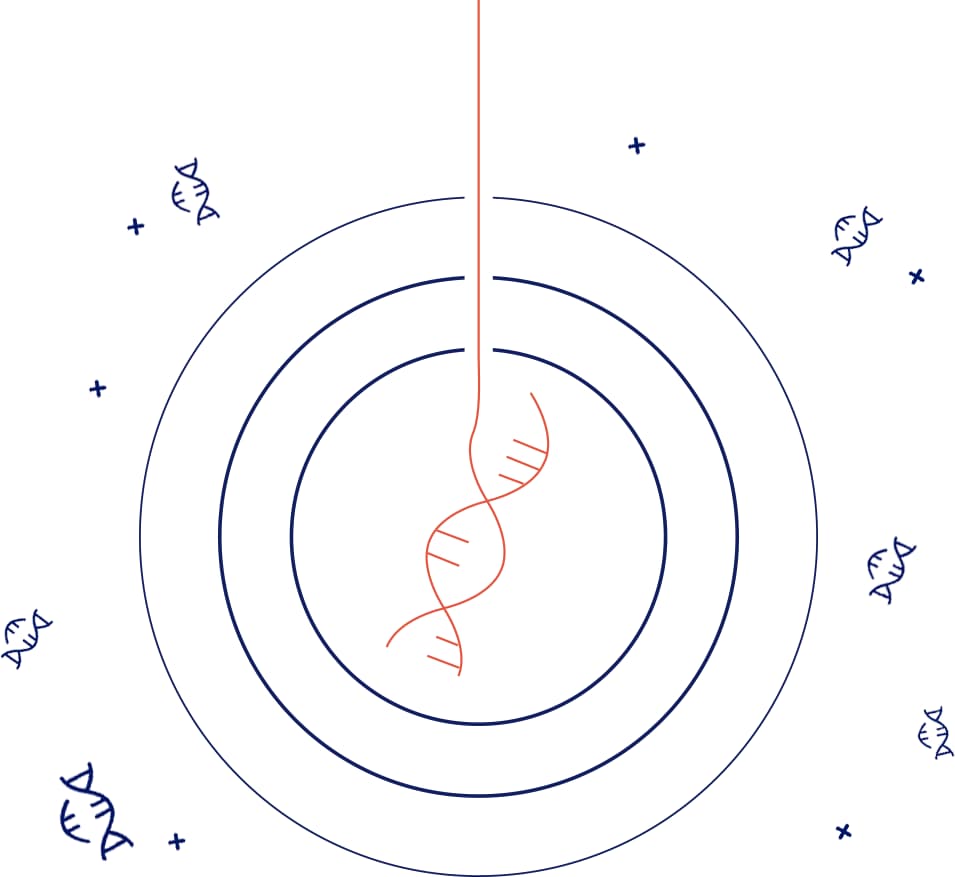Symptoms of diabetes can disguise themselves
Here's our Type 2 Diabetes Risk Test to evaluate your risk and take steps to prevent it.
Take testAbout diabetes

What is
diabetes?
Diabetes is a chronic disease that is caused by either the pancreas not producing enough insulin or the body not being able to use the insulin it produces.
Wait, what is
insulin?
Insulin is a hormone responsible for helping glucose (sugar) from food move from the blood to the cells in the body. There, the glucose is converted into energy, necessary for living.
In diabetes, the body either lacks enough insulin or is unable to use it properly. Thus, in diabetes, glucose is not able to enter cells, but instead stays in the blood and causes damage to various parts of the body, especially nerves and blood vessels.
45% of people are unaware that they have diabetes
Learn about your health condition. Take a minute to answer 8 questions to assess your risk of developing type 2 diabetes.
Take test
Is this a symptom
of diabetes or…?
Two kinds of risk factors can lead
to the development of type 2 diabetes (T2D):
-
Symptoms that may go unnoticed but can be controlled
They can emerge suddenly and seem like a simple discomfort. It may take several years for them to become noticeable:
-
I’m so thirsty!
Diabetes may be the cause of thirst if you drink more than your normal amount of liquid (20 ml per 1 kg of weight) and are still thirsty.
-
I drank too much water before bed
Diabetes may cause you to go to the bathroom more frequently and wake up multiple times a night. This might be your kidneys working to get rid of the excess sugar in your blood.
-
Work exhausts me
If drowsiness persists even after getting good sleep and coffee, it could be due to diabetic fatigue.
-
Can’t get back in shape
If physical activity and diets don't help you get in shape, it's likely that diabetes will cause a rapid increase in weight.
-
-
Factors you can't
control:-
Age over 45 years;
-
Genetics – if your parents had diabetes;
-
Prediabetes – if you have been diagnosed with high blood sugar by doctors in the past.
-
Pregnancy – if there was gestational diabetes or the child weighed more than 4 kg;
-
Polycystic ovary syndrome;
-
Cardiovascular diseases.
-

Risk factors for the development of type 1 diabetes (T1D)
There are no known causes of type 1 diabetes, but there are some patterns. A family history of diabetes can increase the risk, as there are several genes that are associated with type 1 diabetes.
Scientists also believe that the environment, eating habits, and lifestyle play a role in the development of type 1 diabetes.
Get help if you have diabetes
Kazakhstan provides free medical care to diabetic individuals regardless of their health insurance status, including medications, glucometers, and blood sugar test strips. Pump therapy, which involves continuous insulin infusion using an individual wearable dispenser (pump), can be given to children with type 1 diabetes.
You have the option to have an examination
and sign up with your medical organization.
How to prevent type 2 diabetes?
The development of type 2 diabetes can be prevented if you:
- Maintain optimal body weight;
- Eat a healthy diet and reduce your intake of carbohydrates and saturated fats;
- Stay physically active (daily exercise reduces the risk of developing diabetes);
- Avoid stress and stick to a daily routine;
- Quit smoking.
The risk of cardiovascular disease is higher for
individuals with type 2 diabetes and prediabetes.
Therefore, it is very important to monitor
cholesterol levels and blood pressure.
Quitting smoking is very important.
About project
The social and educational project on diabetes mellitus by Novo Nordisk Kazakhstan LLP was developed in 2024 within the framework of the Memorandum of Understanding and Cooperation with the Ministry of Health of the Republic of Kazakhstan in matters of health promotion and improvement of treatment of socially significant diseases.
You can find out more about the company on the
website
https://www.novonordisk.kz
If you have any questions, please contact us by email: eaeu-safety@novonordisk.com .
- International Diabetes Federation. IDF Atlas 10th Edition, 2021. Available from: https://diabetesatlas.org/idfawp/ resource-files/2021/07/IDF_Atlas_10th_Edition_2021.pdf. Last accessed: May 2022.
- Valaiyapathi B, Gower B, Ashraf AP. Pathophysiology of Type 2 Diabetes in Children and Adolescents. Curr Diabetes Rev 2020; 16:220–229.
- Almdal T, Scharling H, Jensen JS, et al. The independent effect of type 2 diabetes mellitus on ischemic heart disease, stroke, and death: a population-based study of 13,000 men and women with 20 years of follow-up. Arch Intern Med 2004; 164:1422–1426.
- Fox CS, Coady S, Sorlie PD, et al. Trends in cardiovascular complications of diabetes. JAMA 2004; 292:2495–2499.
- Ewald N, Hardt PD. Diagnosis and treatment of diabetes mellitus in chronic pancreatitis. World J Gastroenterol 2013; 19:7276–7281.
- WHO. Diabetes. Available from: https://www.who.int/ news-room/fact-sheets/detail/diabetes. Last accessed: May 2022.
- Diabetes.co.uk. Visceral Fat (Active Fat). Available from: https://www.diabetes.co.uk/body/visceral-fat.html. Last accessed: May 2022.
- NIDDK. Risk Factors for Type 2 Diabetes. Available from: https://www.niddk.nih.gov/health-information/ diabetes/overview/risk- factors-type-2-diabetes. Last accessed: May 2022.
- Mosenzon O, et al. CAPTURE: a multinational,cross- sectional study of cardiovascular disease prevalence in adults with type 2 diabetes across 13 countries. Cardiovasc Diabetol. 2021; 20:154.
- Heart UK. Omega-3 fats. Available from: heartuk.org.uk /low-cholesterol-foods/omega-3-fats. Last accessed: May 2022
- Diabetes UK. Diabetes and exercise. Available from: https://www.diabetes.org.uk/guide-to-diabetes/ managing-your- diabetes/exercise. Last accessed: May 2022.
- Pancreatic Cancer Action. Type 3C diabetes (secondary diabetes). Available from: https://pancreaticcanceraction .org/help-and- support/living-with-pancreatic-cancer/ type-3c-diabetes/. Last accessed: May 2022.
- Diabetes.co.uk. Diabetes LADA. Available from: https://www.diabetes.co.uk/diabetes_lada.html. Last accessed: May 2022.







